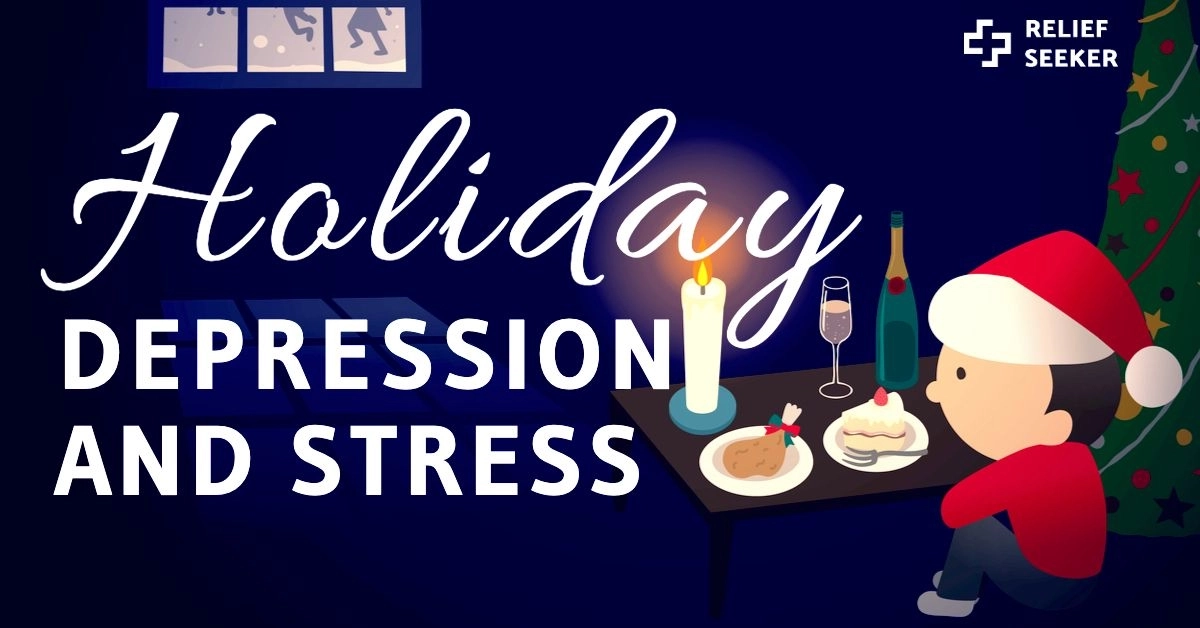Holiday depression and stress is a common mental health condition that arises each holiday season.
The added stressors of shopping, social engagements, and family gatherings can lead to not just holiday sadness or holiday blues — but it can lead to situational depression and major depressive disorder.
Add a pandemic like COVID-19 to annual holiday stress, and millions of Americans are finding themselves more prone to serious depressive episodes.
Holiday Depression Symptoms
Holiday depression symptoms vary from person to person. Family gatherings and office holidays parties are fun for some, but for others can lead to feelings of loneliness and isolation.
Depression might manifest itself as the ‘holiday blues’ in some, ‘holiday stress’ in others — or it might lead to a major depressive episode or mental illness.
Change in personality
Constant worrying
Excessive drinking or drug use
Fearfulness about the future
Feeling overwhelmed
Feeling sad, blue, or indifferent
Inability to concentrate
Lack of interest in activities you once enjoyed
Poor decision-making skills
Sudden bouts of aggression
If not treated, these symptoms can lead to even more severe health conditions, such as lung and heart disease and obesity.
Causes of Holiday Depression and Stress
Holiday depression and stress are caused by several factors. For some, being around family can trigger mental illnesses, eating disorders, and other mental health-related issues. For others, the added stress of shopping, get-togethers, and year-end duties can simply be too much.
People that suffer from mental health disorders such as seasonal depression, anxiety, treatment-resistant depression, and stress can also feel the effects of holidays.
Seasonal Depression
Seasonal depression (also known as seasonal affective disorder) is a type of situational depression that manifests during the darker months of the year. People that suffer from SAD often find themselves lethargic, depressed, and anxious during these months.
As December is often the darkest month of the year for most of the world, it’s also one of the most stressful months for people with this type of depression. Add all the extra duties that the holidays entail on top of that, and it’s easy to see why this month can be emotionally taxing.
Holiday Pressure
We all feel pressure during the holidays, and we usually deal with two types of pressure: the pressure we put on ourselves and the pressure imposed upon us by others.
Everything seems to be heightened in November and December. From holiday shopping to work stressors to parties and commitments — we can’t seem to find the time and resources to get it all done. The most common types of holiday pressure involve money, time, family, and self-care.
Money Stress
Money stressors are one of the main causes of stress, anxiety, and depression. The holidays can often only exacerbate this situation.
If you think that money mostly stresses out Americans living at lower income levels, you might want to think again. Money is one of the most common causes of marital arguments, and it’s the topic of such arguments in households at every tax bracket.
This type of stress only gets worse during the holidays when money becomes an incredibly hot topic. Spending money on gifts, parties, dinners, and charity can all add to everyday financial stress.
Time Scarcity
We all suffer from time poverty. While most of us are happy to work and work and work to make ends meet, it’s not as common to find someone that makes time abundance a priority over work and money.
Time seems to be even more precious during the holidays. In addition to our regularly scheduled programs, we find ourselves worried about finding time to shop, attend holiday gatherings, and finish up year-end work requirements.
Basically, we’re at our busiest when we’re already the most stressed.
Time scarcity can lead to stress, anxiety, and depression. Many people feel obligated to do too much in the months of November and December that they start to feel shame or guilt if they can’t check everything off their holiday to-do lists.
Family Stress
Family stress is another huge contributor to holiday depression — and it affects everyone differently. Some of the most common causes of family stress include:
Visiting family you may not like
Agreeing to too many social engagements
Worrying about arguments or clashing personalities
Dealing with divorced family members
Making time for too many family members
Dealing with everyone else’s stress and depression
While family is the one thing that many people are grateful for during the holidays, our family members can also lead to more stress and anxiety.
Loneliness
It’s often hard to remember that people can be even lonelier during the holidays than they are the rest of the year — and loneliness doesn’t just strike those of us that aren’t surrounded by family and friends.
In fact, loneliness can happen anytime, anywhere; it often happens when we’re around too many people or when we feel inundated by too many personalities all at once.
No matter why we feel lonely, loneliness is a real problem. It’s one of the leading contributors to anxiety, depression, obesity, diabetes, lung disease, and heart disease. It can drive us to drink, overeat, smoke, and use recreational drugs.
Lack of Self-Care
Let’s face it: we all overindulge during the holidays. We overeat, drink too much, and stay out too late. We work too hard and don’t sleep enough at night. And don’t even think about exercising or drinking enough water.
Whatever self-care habits we have generally get thrown to the wayside. Add all of the stress and time restrictions onto that? Our hormones get out of whack, and we end up sick, tired, and depressed.
When we don’t take care of our bodies and minds, it’s hard to function on a very basic level.
Existential Crises
The holidays end up as a time for self-reflection. In December, we often end up mulling over the previous year, including what went wrong and what went right (in our minds at least).
We find ourselves thinking back to the previous year's New Year's resolutions (and whether or not we were able to stick to them). Another year has gone by and what do we have to show for it?
We look around and see our friends surrounded by loved ones, posting happy photos on social media, and living their best lives. Then we start judging ourselves against them.
December is one of the most common months for an existential crisis. We’re often so focused on what didn’t go right at the end of the year that we forget to feel grateful for what we have. Sound familiar?
How to Prevent Holiday Depression
Luckily, there are plenty of steps we can take to prevent (or at least mitigate) holiday depression. While we may not be able to avoid all types of depression or anxiety during the holidays, implementing a few self-care tactics can greatly reduce the impact of common holiday stressors.
Practice Self-Care
Practicing self-care isn’t easy. Self-care is all the little things we do throughout the day that allow our bodies to function.
Basic self-care might include brushing your teeth, drinking plenty of water, exercising, and getting enough sleep. Self-care can also include taking time to meditate, brush your hair, get a massage, or sit alone in a darkened room for an hour.
Basically, it’s whatever you need to do to be a functioning human in the world.
It’s easy to forget about all these seemingly unimportant tasks when we’re so busy doing stuff for others during the holidays. Yet, taking time for ourselves can actually make us more able to be there for others in deep and meaningful ways.
Limit Alcohol Consumption
We know, we know: everyone says to limit your alcohol consumption during the holidays. And that’s easier said than done.
When we’re under stress, all we want to do is eat and drink — especially for those of us that deal with social anxiety. Yet, too much alcohol can lead to higher levels of depression, anxiety, and stress.
It can dehydrate the body and engage our fight-or-flight hormone responses. Limiting alcohol consumption can help regulate serotonin, decrease levels of cortisol and adrenaline, and increase our energy levels.
Limit your alcohol to just a few drinks (one or two) a day. Alternate alcoholic beverages with water to stay hydrated.
Get 8 Hours of Sleep
Sleep is so important. Getting enough sleep each night can help increase immunity responses and decrease our chances of getting sick. Our bodies need sleep to recover each night, and our cells regenerate while we sleep. We even release excess weight and toxins while we sleep.
Getting enough sleep each night is an important way to reduce stress, anxiety, and depression. If you’re not getting enough sleep, you may want to chat with a doctor about sleep aids (both prescription and supplements) or consider getting tested for sleep apnea.
Accept the Unexpected
The holidays are full of surprises.
Unfortunately, these aren’t always ‘happy’ surprises. Your mom isn’t going to make it to Christmas dinner and you’ll be stuck hanging out with your weird uncle and cousins alone. Your husband has to work late on the evening of your office holiday party, and you’ll be going solo. Your best friend is getting divorced and needs to chat every evening (just to add to your long list of to-dos).
We can’t control what we can’t control. It’s best to accept that things won’t go as planned — but also remember that sometimes the unexpected can also bring good surprises too.
Eat Healthfully
Who isn’t going to a holiday party that’s featuring the most decadent food you’ll find all year? While we all tend to overindulge during the holidays, it’s important to remember to eat a few veggies, too.
It’s also important to practice moderation when you’re at parties or holiday dinners. While overeating can release feel-good hormones like serotonin and dopamine, consistent overeating can mess up your gut bacteria (and lead to a dip in serotonin).
If you are suffering from an eating disorder, this time of year can be especially triggering. If so, you may want to consider joining a support group or talking to a therapist that specializes in eating disorders.
Get Exercise
Our exercise routines are often the first thing to go when we’re trying to fit holiday shopping, parties, and year-end work into our schedules. Yet, a little physical activity into our schedules during the holidays may be the best thing we do all year.
Exercising can help you relax and destress. It boosts the feel-good chemicals dopamine, serotonin, and norepinephrine. It can help take your mind off your to-do list while supporting your heart and lungs.
Basically, it’s an all-natural form of Xanax.
Try to get at least 30 minutes of exercise per day — and possibly more if you need a mood boost. Or, make walking your new best friend with the help of a fitness band and fitness tracker apps.
Practice Mindfulness Exercises
Our to-do lists often seem more important than they actually are during the holidays. It’s easy to get stuck in a cycle of perfectionism when we’re trying to make the holiday season perfect for family and friends.
Basically, we end up sweating the small stuff.
A great way to bring your body and mind back to the present (and lower levels of anxiety and depression) is mindfulness meditation. All it takes is a few minutes of concentrated breathing to return to your center.
Don’t know how to meditate? There’s an app for that! Mindfulness meditation apps and health apps are a great way to take a break from your stressors — even if you’ve never meditated before.
Savor the Moment
It’s so easy to get caught up in the chaos of the season that we sometimes forget to just have fun during the holidays!
If you find it too difficult to enjoy yourself during the holiday rush, you may want to start a savoring practice or gratitude practice.
Each morning, write down five things you’re grateful for, and each night, make a list of the day’s highs and lows. Writing down your lows allows you to vent your frustrations. Often, you realize that your lows aren’t so awful when they’re written in black and white. It’s also easy to forget the things we love about the holidays unless we take some time to write them down.
Volunteer
Taking care of complete strangers can actually be an act of self-care. When we help people that are less fortunate than ourselves, it’s easy to feel grateful for the things we do have. Volunteering also creates personal connections with others — which is one way to beat holiday loneliness.
If you can’t find time to volunteer, try to do something small and nice for someone each day in December. It could be buying someone a cup of coffee, giving a homeless person a few dollars, leaving a big tip, or paying someone a compliment.
Studies show that spending money on others promotes happiness and is more rewarding and satisfying than spending it on yourself, anyway.
Treating Holiday Depression
The important thing to remember when it comes to holiday depression is that you’re not alone. Millions of people suffer from depression, stress, and anxiety during the holidays. And while many people suffer from this type of depression, not every person experiences it the same way.
If you’re already feeling the effects of depression, you may want to consider talking to a therapist, joining a support group, or taking medication.
Talk to a Therapist
Talk therapy is one of the gold standard treatments for depression, anxiety, and stress. You can discover the root causes of your emotional triggers while working through your current issues.
The best part is that you don’t even need to schlep all the way to a therapist’s office for therapy anymore; you can get treated via video, text, and voice chat. Companies like Talkspace match you with an online therapist. Simply fill out a health questionnaire, explain your symptoms, and get matched with a therapist that specializes in your condition.
If you want to chat with other people dealing with holiday depression and anxiety, sites like Wisdo offer a platform for virtual support groups. Talk through your symptoms with others that have suffered through the same emotional state.
Consider Medication
While talk therapy is one of the best ways to deal with mental illness, results are often slow. If you need to feel better fast, you might want to combine your talk therapy with psychiatry.
Mental health professionals often recommend a combination of talk therapy and antidepressants or antianxiety medications.
Simply make an appointment with a psychiatrist (you can even make an online consultation through platforms such as Talkspace Psychiatry), and chat with a medical doctor about your symptoms. Consultations usually last about 45-to-60 minutes. Your doctor will recommend a prescription medication and even write you a prescription.
If your feelings of depression and anxiety are so overwhelming that you’re considering hurting yourself or someone else, call 911 or the National Suicide Prevention Lifeline at 800-273-8255.
Post-Holiday Depression
The only thing that’s possibly worse than holiday depression is post-holiday depression. This is the depression and anxiety that sets in after the parties and family gatherings have ended. The winter months of January and February can be brutal for people with depression.
Yet, this time of year doesn’t need to be spent suffering. Spending time with friends and family (in-person or via online platforms) can help you through this time. Experts also suggest taking the month of January or February to concentrate on wellness goals.
Take part in a dry January or a fitness challenge. Treat yourself to an at-home spa night. Take an online yoga class with friends that live on the other side of the country.
And if post-holiday depression doesn’t go away by February? Consider talking to a therapist, trying group therapy, or opting for medication.


